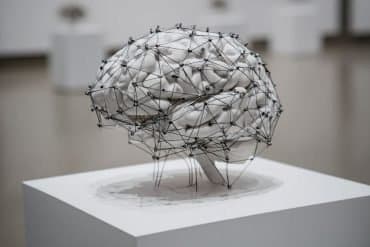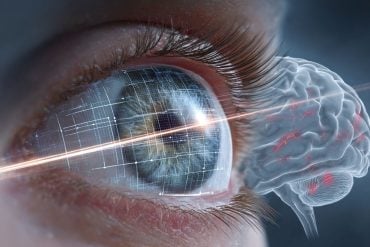Summary: A new mRNA vaccine developed in Japan has been shown to suppress abnormal blood vessel growth in the retina of mice, offering hope for patients with age-related macular degeneration (AMD). Current treatments require repeated injections directly into the eye, but this vaccine can be delivered intramuscularly, making it less invasive and easier to administer.
By targeting LRG1, a protein linked to abnormal angiogenesis, the vaccine triggered strong antibody responses that reduced retinal damage by up to 85% in mouse models. If successful in humans, this approach could transform AMD treatment and significantly reduce the burden of eye injections.
Key Facts
- Mechanism: The vaccine blocks LRG1, a protein promoting abnormal blood vessel growth.
- Effectiveness: Reduced retinal leakage by 85% and lesion size by 82% in mouse models.
- Advantage: Works as well as anti-VEGF therapy but requires only a simple arm injection.
Source: Institute of Science Tokyo
An mRNA vaccine developed by researchers from Japan suppressed abnormal blood vessel growth or neovascularization in the retina of mouse models.
Neovascularization is a condition that is caused by age-related macular degeneration (AMD), a leading cause of vision loss for elderly people.
The vaccine can be delivered intramuscularly and is as effective as current therapies that require frequent eye injections, offering a more comfortable and easier-to-administer alternative for treating AMD and other neovascular eye diseases.

One of the leading causes of vision loss in people over 60 years is age-related macular degeneration (AMD), a condition that affects nearly 200 million people worldwide. One form of the disease, known as wet AMD, is caused by the growth of abnormal vessels in the eye, a condition known as neovascularization.
These blood vessels leak fluid buildup in the retina, which gradually leads to vision loss, if left untreated. At present, the only way to slow this process is through regular injections of anti-angiogenic drugs that stop the formation of blood vessels directly into the eye. However, these must be taken regularly, and a few patients stop responding to the treatment.
Now, researchers at Institute of Science Tokyo (Science Tokyo), Japan, have developed a novel mRNA vaccine that can be injected intramuscularly, making it easier to administer and less burdensome on patients than current treatments that require direct injections into the eye.
The vaccine was tested in mice and shown to strongly suppress retinochoroidal neovascularization, offering hope to millions of patients with AMD.
The research team was led by Professor Satoshi Uchida of the Department of Advanced Nanomedical Engineering, Science Tokyo, and Visiting Professor Yasuo Yanagi of the Department of Ophthalmology and Micro-technology, Yokohama City University, Japan.
The findings were made available online on July 02, 2025, and published in Volume 61 of the journal Vaccine on August 13, 2025.
“The COVID-19 pandemic highlighted the remarkable potential of mRNA as a vaccine platform. Inspired by those successes, we sought to expand its use beyond infectious diseases and cancer to chronic eye conditions.
“To our knowledge, this is the first study to show that an mRNA vaccine can suppress pathological neovascularization in animal models,” says Uchida.
Typically, mRNA vaccines carry instructions that enable the body to produce antibodies against infectious agents. In this case, the vaccine delivers mRNA encoding leucine-rich alpha-2-glycoprotein 1 (LRG1), a protein known to promote angiogenesis and found in elevated levels in patients with AMD. As a result, the body produces antibodies that specifically bind to and inhibit LRG1.
The researchers tested the vaccine on two mouse models of eye disease: one in which choroidal neovascularization (CNV) was induced, and another that naturally develops CNV.
After just two intramuscular injections given 14 days apart, both models showed strong antibody responses that significantly reduced abnormal blood vessel growth in the retina. The effects were visible within a week of the first dose.
By the 21st day, the laser-induced CNV model showed an 85% reduction in leakage and an 82% reduction in lesion size. In the natural NV model, lesion size decreased by 55% on the 28th day.
Crucially, the vaccine appeared safe. It did not interfere with normal blood vessel growth, damage healthy retinal tissue, or trigger harmful immune reactions in other organs of the mice. At the same time, the treatment was as effective as standard anti-vascular endothelial growth factor (VEGF) drugs, yet free from their major drawbacks.
“The effects of LRG1 mRNA vaccination on reducing endothelial and microglial cells were comparable to those of anti-VEGF antibody therapy.
“Unlike conventional treatments requiring repeated intravitreal injections, this vaccine may provide long-term benefits with a single intramuscular dose, potentially reducing the treatment burden for patients,” says Uchida.
If proven effective in humans, this vaccine could replace the frequent, uncomfortable eye injections that patients with AMD currently face, with a simple arm injection.
About this AMD and genetics research news
Author: Miki Yamaoka
Source: Institute of Science Tokyo
Contact: Miki Yamaoka – Institute of Science Tokyo
Image: The image is credited to Neuroscience News
Original Research: Open access.
“mRNA vaccination mitigates pathological retinochoroidal neovascularization in animal models” by Satoshi Uchida et al. Vaccine
Abstract
mRNA vaccination mitigates pathological retinochoroidal neovascularization in animal models
Retinochoroidal neovascularization (NV), involved in macular degeneration, diabetic retinopathy, and other ocular diseases, causes vision impairment and blindness.
Current treatments rely on repeated intraocular injections of anti-angiogenic drugs, which are burdensome for patients and clinicians, and some patients fail to respond to the treatments.
This study investigates the potential of mRNA vaccination to mitigate NV and treat ocular pathologies.
The vaccine targets leucine-rich alpha-2-glycoprotein 1 (LRG1), a protein specifically expressed in pathological neovascularization, inducing anti-LRG1 antibody responses in mice. In a laser-induced NV model, the LRG1 mRNA vaccine reduces NV area and leakage while inhibiting microglial cell infiltration.
Histological analysis shows no adverse effects on retinal architecture or glial cell activation.
Additionally, in Vldlr knockout mice, LRG1 mRNA administration suppresses ongoing neovascularization and downregulates key angiogenic mediators.
These findings highlight the therapeutic potential of LRG1 mRNA as a novel strategy for CNV-associated diseases.






